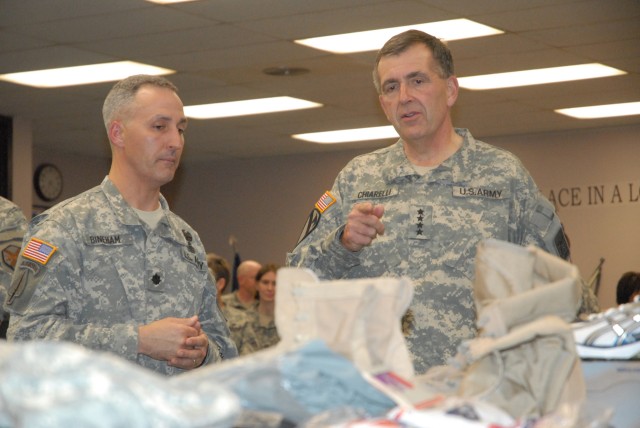
FORT JACKSON, S.C. -- Confined to a wheelchair, barely aware of his surroundings, reduced to having to wear a diaper, Spc. Kyle Norton is unable to perform even the simplest of tasks. Just a few months into his first deployment, a bullet that barely missed its mark left Norton in a vegetative state.
The infantryman was not hit by a round from an enemy in Iraq or Afghanistan, but rather a bullet from his own weapon as Norton tried to take his own life.
The fictitious scene above is played out in "Beyond the Front," an interactive DVD being used as part of the Army's chain-teaching program to help combat the increase in suicides. In the DVD, Norton learns that his fiance is pregnant by his best friend, his bank account is wiped out and then his battle buddy is killed in a firefight. As the scenes play out, viewers choose what actions Norton will take -- seek help or keep his problems to himself.
"Those scenarios are very realistic," said Lt. Col. Kevin Stevenson, chief of Social Work Services, Moncrief Army Community Hospital. "Those situations were the same ones I dealt with while I was in Iraq. Those things do happen."
Last year, 143 Soldiers took their own lives. That is the highest number since the Army began keeping records in 1980. It was the fourth year in a row that the number of suicides increased.
For 2009 the numbers continue to grow. In January, there were 12 suicides and 12 more suspected suicides are still under investigation. That is 50 percent more than the number of Soldiers who died in combat during the same time frame. In February, there were two confirmed suicides and an additional 16 suspected ones.
"We have to get a handle on this," Gen. Peter Chiarelli, Vice Chief of Staff of the Army, told the cadre of the 120th Adjutant General Battalion (Reception) Tuesday. "We are dealing with a tired and stressed force after seven plus years at war. While we can't alleviate the demand on our forces for the foreseeable future, we can provide better tools for coping with the stress."
TRADOC leaders are looking at how to help Soldiers learn to better manage stress from day one. During a visit to Fort Jackson last month, TRADOC Commander Gen. Martin Dempsey said they are looking at ways to incorporate stress management training into Basic Combat Training.
"I think that we need to take a look at a comprehensive fitness program, which we already are, that right from the beginning of a young man's or woman's experience in the Army we begin building coping skills before the stress comes," he said. "What we are trying to do is identify skills that we can give our Soldiers -- intellectual, physical, spiritual -- to build those skills into someone from the time they raise their hand, so that when stress hits, they are armed to deal with it."
In addition to indentifying Soldiers who might be at risk for suicide, both Chiarelli and Stevenson agree that getting rid of the stigma that surrounds seeking mental health treatment is a major key to reducing the number of suicide attempts.
"Is there a stigma still out there' Yes," said Stevenson. "But we have worked, and are working, to reduce those barriers. We want you to know that going to mental health is not a sign of weakness, but rather a sign of strength that you recognize that you do need help."
"We have to reduce the stigma surrounding seeking mental health help. Getting help for emotional problems should be as natural as seeking help for a sprained ankle," Chiarelli added. "Asking for help is a sign of strength not weakness. Part of our Warrior Ethos is personal courage and recognizing that you need help, and being willing to seek that help requires personal courage."
Chiarelli, who has been chosen to oversee the integration of the Army's efforts to prevent suicide, chose Fort Jackson to begin a seven-post tour to learn more about how to better identify and treat Soldiers who might need mental health help.
"There are a multitude of factors involved in suicide, and there is no one single solution," he said. "In the majority of cases, the Soldiers were dealing with relationship issues, but often there were other factors involved such as legal, financial, and medical problems. Individually or in certain situations, these factors can be manageable, but when compounded by the stress of deployments and lengthy separations, the situations can be overwhelming."
For those who might be, or for those who suspect someone may be considering suicide, help is available locally through the chain of command, chaplains and the department of mental health at MACH.
"The good news is that depression which can lead to suicide is one of the most easily treated mental health disorders," Stevenson said.

Social Sharing